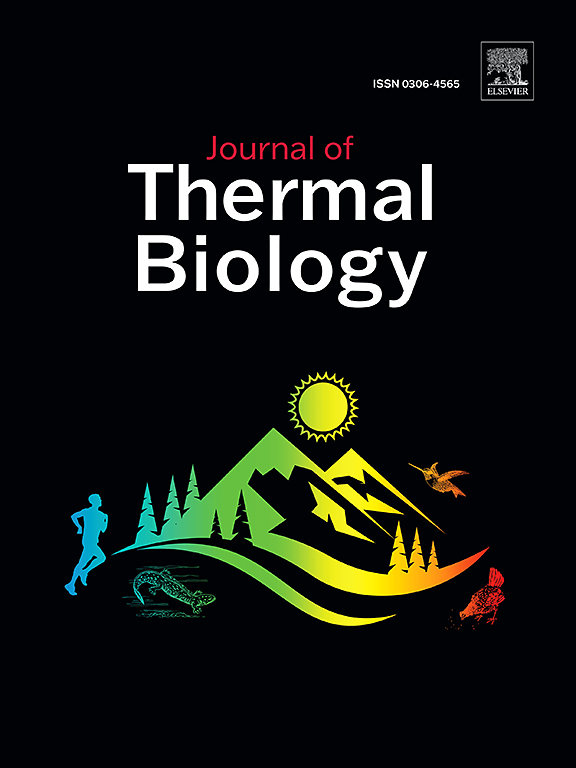热胁迫对黑腹果蝇精子发生和卵子生成的影响具有生命阶段特异性
IF 2.9
2区 生物学
Q2 BIOLOGY
引用次数: 0
摘要
热浪等不可预测、频繁和强烈的气候事件给外温动物造成了有害影响,生物多样性正日益受到威胁。除了生物的健康和存活之外,高温引起的热应激还导致生殖能力下降,这是一个重要的健康后果。许多有关这些影响的研究都将生物暴露于成体阶段或整个发育过程中的热应激,通常侧重于各生命阶段的累积影响,而且这些研究往往只考察一种或另一种性别。这种方法可能无法反映许多极端高温事件的短期性质,并限制了我们对短寿命生物的阶段和性别特异性适应性后果的了解。为了弥补这一不足,我们利用黑腹果蝇研究了不同发育阶段的性别在不同强度的短期热胁迫下的生殖表现。我们发现雄果蝇的热敏感性高于雌果蝇,而且在成虫萌发过程中,雄果蝇的热敏感性增加,导致生殖几乎完全失败,恢复速度大大减慢。这些结果突显了在敏感期即使是短暂的热应激也会影响种群动态和持续性。我们的研究结果还强调,将性别和生命阶段结合起来可以改善对物种持续性的预测。本文章由计算机程序翻译,如有差异,请以英文原文为准。
Life stage-specific effects of heat stress on spermatogenesis and oogenesis in Drosophila melanogaster
Biodiversity is increasingly threatened by unpredictable, frequent, and intense climatic events like heatwaves that pose harmful impacts on ectotherms. Beyond the health and survival of organisms, reduced reproductive performance has emerged as a critical fitness consequence of thermal stress induced by high temperatures. Many studies on these effects expose organisms to heat stress during the adult stage or throughout development, often focusing on cumulative effects across life stages, and they tend to examine one or the other sex. This approach may not reflect the short-term nature of many extreme heat events and limits our understanding of stage- and sex-specific fitness consequences in short-lived organisms. To address this gap, we used Drosophila melanogaster to investigate the sex-specific reproductive performance following short heat stress of varying intensity at different developmental stages. We found the thermal sensitivity to be higher in males than females, and to increase toward adult emergence, leading to nearly complete reproductive failure and substantially slowed recovery. These results highlight how even brief bouts of heat stress during a sensitive phase could affect population dynamics and persistence. Our findings also underscore that incorporating both sex and life stage could improve predictions of species persistence.
求助全文
通过发布文献求助,成功后即可免费获取论文全文。
去求助
来源期刊

Journal of thermal biology
生物-动物学
CiteScore
5.30
自引率
7.40%
发文量
196
审稿时长
14.5 weeks
期刊介绍:
The Journal of Thermal Biology publishes articles that advance our knowledge on the ways and mechanisms through which temperature affects man and animals. This includes studies of their responses to these effects and on the ecological consequences. Directly relevant to this theme are:
• The mechanisms of thermal limitation, heat and cold injury, and the resistance of organisms to extremes of temperature
• The mechanisms involved in acclimation, acclimatization and evolutionary adaptation to temperature
• Mechanisms underlying the patterns of hibernation, torpor, dormancy, aestivation and diapause
• Effects of temperature on reproduction and development, growth, ageing and life-span
• Studies on modelling heat transfer between organisms and their environment
• The contributions of temperature to effects of climate change on animal species and man
• Studies of conservation biology and physiology related to temperature
• Behavioural and physiological regulation of body temperature including its pathophysiology and fever
• Medical applications of hypo- and hyperthermia
Article types:
• Original articles
• Review articles
 求助内容:
求助内容: 应助结果提醒方式:
应助结果提醒方式:


